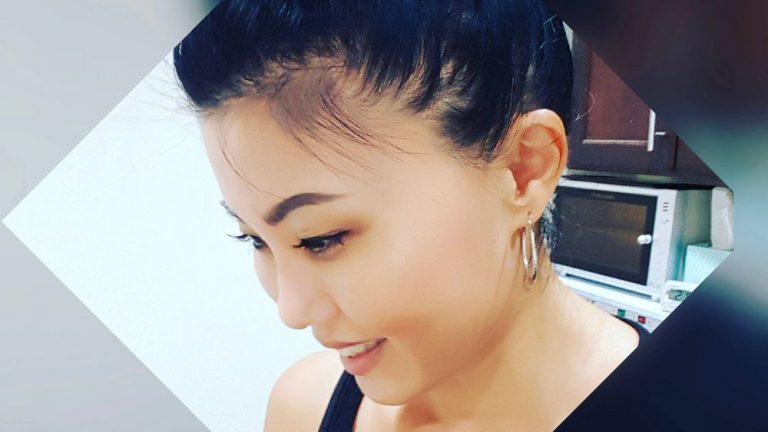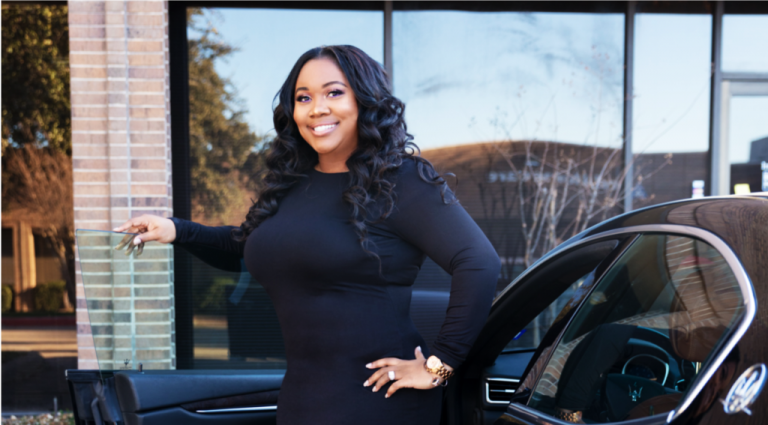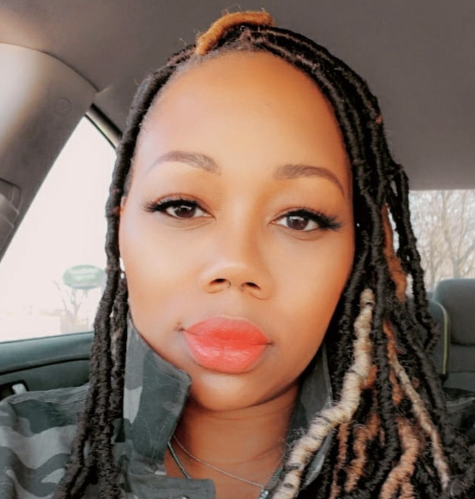How to Become an Esthetician eBook
Kim Blackmon lends her knowledge in our latest eBook on How to Become an Esthetician.
Download for free here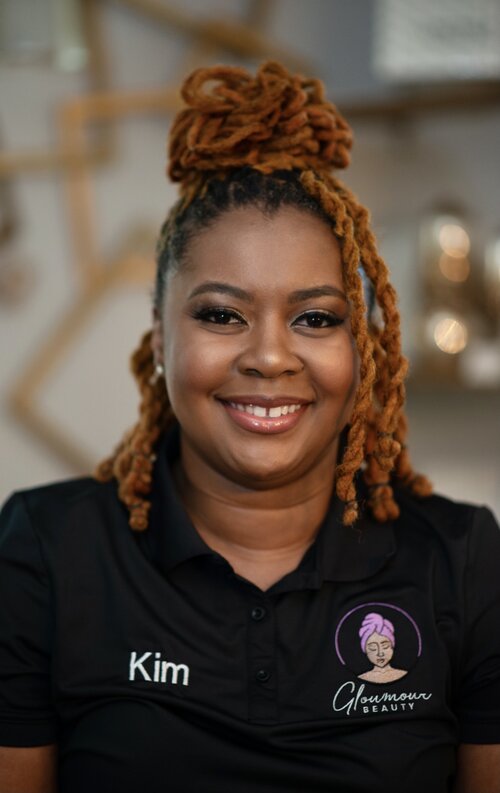 4.4k
4.4k
I liked PocketSuite because it has the forms. I can pay staff and everything through the app. It’s been very good. I can categorize everything and now have subscriptions. I use everything there.
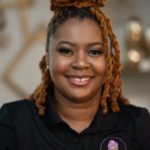
Kim Blackmon
PocketSuite Esthetician Pro
Glowmour Beauty Pro, Kim Blackmon, is an Esthetician in Florida. Her unique experience in skincare with a background in the military makes her a great asset to our PocketSuite Pro community. Kim talks to CEO, Chinwe Onyeagoro, about the lessons she learned in the military and how she applies them to being an entrepreneur today.
So first and foremost, you’re a vet. I haven’t met an esthetician that’s also served in the military. Thank you so much for your service. How did your journey with the military start? What was that experience like? Where did you hold the beauty work?
Okay. I went into the military a month out of high school. I followed my brother to the recruiter’s office when I was in the sixth grade. I heard all the perks that the air force had compared to the army or the marines. And she was like, “Oh, we don’t stay in hotels. We do this, we do that. We don’t go out into the woods.” I was like, “Oh, that’s right up my alley”. I made up my mind early on as a child that I wanted to go into the air force. I started the process my junior year of high school and I left. I was in the military for eight years. I was stationed in Montana, Hawaii, Korea. I visited Japan and Alaska. I got the Pacific tour. I got medically retired in 2013 and my life was in the air force.
So I left crying at my retirement ceremony. I’m googoo crying because I didn’t know what else I was going to do. I had no other goals or plans in life. I was living my best life in the military. I moved to Tampa and I went to school. I started doing makeup as a side hustle. Then I started selling makeup and that catapulted into a machine that washes and dries makeup brushes.
So I said, let me go to school and learn more about skin. I need to have some knowledge of actual skincare. In Florida, you’re supposed to be a licensed esthetician to charge for makeup. So I had some GI Bill benefits left. I went to school and got that. But I fell in love with skincare during that process. At the time, I was dealing with late adult acne. So it was right on time for what I needed. Then I stopped doing makeup. I transitioned my makeup clients to skincare and it’s been on the up and up ever since. So I’ve been doing skincare since 2016.
That is quite a story. Oh my goodness. I hope they send you back to just talk to folks in the air force that are going to be leaving as well, transitioning back to civilian life because you’re such an inspiration.
It was rocky for a while. I will say it was rocky because it was just the unknown of what do I want to do? I did learn while I was in the military that I didn’t want to work for anybody else. That definitely pulled me down the entrepreneurship track.
What would you say are a few lessons that you learned in the military that you now bring to Entrepreneurship?
For one, it is definitely being prepared. I worked directly for my commander. I was a Unit Deployment Manager. So I was in charge of knowing the status of all of our deployment property as well as our personnel. So having to be 10 steps ahead and being able to anticipate what questions she would have when we have our meetings. So just learning to know, have a plan A, B, C, and possibly a D for what could go wrong.
Okay. If this happens, I know that I need to do this, or I should do it in that given time. Being able to plan out those additional steps and not having to scramble to figure it out at the last moment. That was probably the most valuable thing that I’ve learned. I also worked in food service, fitness, lodging, and mortuary. So just learning to deal with people in every phase of their life.
The job that I worked when I was in college, after I got out, was customer service. That definitely sharpened my skills. We literally got beat every day for people not getting their newspapers. So you learn to have a certain level of patience with people. We get the same training in the military. So it’s just the reiteration on the civilian side that a lot of things are very similar to what they’re trying to teach. The military isn’t all bad. Some people think that but it was very valuable to me.
No, not at all. I actually think the military gets a bad marketing job. Right. Just in terms of the work. You all are putting yourself on the front lines, literally for all of us. I’m having an “A Few Good Men” moment. When I think about the military, it’s a life and death situation. How do you go from life and death to beauty? How do you translate that in terms of finding the meaning for you in the work itself?
Like I said, it was a challenge. It was rocky at times, trying to figure it out. There were many times I wanted to quit school. I got a Bachelor’s in Entrepreneurship. I wanted to quit school and just go get a job to make ends meet. I’m used to living a certain type of lifestyle, having 30 days off. It was definitely challenging. I moved to Tampa because I had family here so that made it a lot easier. But in the military, depending on where you go, you tend to build a family where you’re at. So you have your certain crew of people that you definitely deal with. That was the same thing when I moved here. I relied on my brothers to let me figure out what I needed to do.
I worked full time for three years, doing skincare at night and on the weekends. So that taught me too, that this is your passion. I come in here and work three more hours and I am fine, like not tired, like I’m happy. This showed me, “Okay. This is what we’re supposed to be doing. We’re having fun.” So I was able to do that for three years. I was supposed to leave my job, but COVID delayed that. So I was able to get out and I’ve been working full-time at the spa since November, Thanksgiving last year.
People don’t realize that you’re a superhero. Or should I say she-ro? Literally, people don’t realize that entrepreneurs, it’s not like how did you do it? It’s like there was no other option but to do it. So you just push through because the work is so energizing, it’s what gives you that lift to keep going when others would be like I’m tapping out.
Right. Now that push for me is I have employees. So it’s like, I have to keep them paid and keep people coming in the door. I’m responsible for them. So that’s the next thing that pushes me to continue and to be great in this business.
Let me ask you this because whenever we talk to estheticians, I’m always calling the BS meter. They all have a story about having bad skin. I’m looking at you like there’s no way. Right? Your treatment must be amazing because your skin looks beautiful, glowing. So tell us about your story of acne, whenever it happened. We’re going to suspend disbelief for now.
It’s okay now. You have a little blush and some contour, but I’ll give some credit to this GLAMCOR light because it is working for me right now. I’d never had skin issues all through high school, military career, never had any. I never wore makeup. I might put on some eyeshadow, maybe mascara, that was it.
When I moved from Hawaii to Florida, I don’t know what it was about the nice, cool breezes out there and the sand and whatever here in Florida, my skin went haywire after about a year of me living here. So it’s just constantly breaking out. I’m getting facials. I was washing my face. I’m using what they recommend, nothing was working. So I finally beat the drums like I can go to the Veteran’s Association and go to the dermatologist for free. I did. As soon as I went, they gave me some prescription. Cleared right up.
Wow.
I was like, “That’s all it took?” I battled with it for a year on my own. I can do this. That’s no problem. I had some Neutrogena, you know I can get it. But when I started school for skincare, I had it pretty much under control. I still had all the scarring. It would literally be one here, one here, one here. I could connect the dots on my cheek. That’s how bad it was. I got to the point where I could not go out of the house without makeup.
I got the 20 minute face down because I got places to go, things to do. I gradually, when I started working at the full-time job, my career during HR, it was at a warehouse and we had over 300 employees there. There were a lot of men. I was like, “I don’t want that attention.” So I stopped wearing makeup. I basically had to learn new confidence. Being comfortable in my skin with all my scars and no arched eyebrows.
It was definitely a process. I say, it took me probably a year to get truly comfortable wearing my skin. But then I realized that was the biggest billboard. It was to have clear skin and people always complement me. I’m like, “It’s a mask.” I would say as estheticians, we’re probably harder on ourselves than anyone. So that’s why I was like, “It’s okay today. But you know, when I take this off.”
You don’t know what us non-professionals go through, clearly, because you’re in the industry. Well, let me ask you this because I hear this a lot where people are battling things with their skin and it’s beyond what they should be dealing with. They should be going in to see a dermatologist. They should be going in to see an esthetician to really get help. What signs can you advise people to look for in their own mirrors at home to calibrate when to see someone like you or a dermatologist? Is this something I can take care of? Or is this something I should really go see a professional about?
For me, my recommendation to people is if you’ve been battling for more than three months and it’s kind of the same issue you’re buying the expensive product and nothing’s working, it’s definitely time to go to the dermatologist. Sometimes, we waste money on hundreds of dollars of product, but we could’ve spent those couple hundred and gone to the dermatologist. Usually they give samples of whatever they prescribe. So if you can’t afford the medicine, you do have some to get started.
Now I do recommend seeing an esthetician in between sessions with the dermatologist. But if it’s something that is not getting under control within two or three months, definitely go to the professional because you’re just throwing money in a bucket.
I specialize in corrective skincare, but I can tell when it gets to a certain point like, “Hey, we’ve done five pills. We’ve done this and it’s not me at this point.” You know? But definitely education is what’s key for people. As people of color, we aren’t taught how to properly take care of our skin, to wear sunscreen, not to use toothpaste to clear up pimples.
Oh my gosh.
Nobody taught me these things. So definitely, I try to educate my clients when they come in. So like,
“Okay, we’re going to go through this course of elimination to figure out. Is it sugar? Is it coffee? Is it chocolate? Is it dairy that’s causing these skin issues?” So we can’t narrow it down then you may want to go see your doctor.
I just finished the course for laser electrolysis. We learned a little bit more about disorders of the glands. So now, when I see hair growing in certain regions, I can say, “Hey, you might want to ask your doctor about testing you for PCOS or this thing. Check your thyroid because you’re having abnormal hair growth in these areas and you shouldn’t.” So it’s like, I absolutely love aesthetics now.
It’s amazing. It’s like, whatever you put on or in your body could impact your skin. So you basically have to know it all to be able to identify those triggers. That’s fascinating.
Right.
Kim, let me ask you this because I’ve talked to a number of estheticians who talk about focusing on multicultural skin, diverse skin types. Can you tell me, is there a spectrum of treatment where from Caucasian to Puerto Rican, to Mexican, to Black, to Black African to what have you? What is the spectrum that you guys look at as you think about the different treatment types? Or is it really just on a case by case basis? It’s about your skin type. It’s not about your ethnicity?
Yes, I can. I just took my test last week. So all this stuff is fresh. Well, what they use is a scale called Fitzpatrick Scale and it ranges from Type 1 to Type 5. It’s definitely based on ethnicity. So your lighter, your red heads, your people that burn really easily. They’re going to be your Type 1. Your Type 2 are going to be probably your normal Caucasian, European descent. Type 3 is probably going to be Asian. Type 4 are going to be your Hispanic to lighter skin African-Americans. Type 5 is going to be your darker skin. We’re talking about Duckie. Really chocolate.
So they teach you pretty much what’s taught is between 1 and 4. You’re going to be careful with 4 through 6 or 1, 3. And then 4 through 6, you want to be really careful with because they can keloid, they can burn. There are small sections and they’ll tell you, don’t do this on Fitzpatrick’s Types 4, 5 or 5 and 6. So those are the types of things you have to pay attention to. There’s certain chemical peels we can’t, I wouldn’t use on people that look like me because it’s more reactive in the skin because the melanin makes it a lot more reactive.
The research that’s been done is on pretty much 1 through 3. Since I’ve become an esthetician, there are a lot more classes and a lot more courses that speak to treating our skin. I will say for people of color, I deal with a lot of clients that have been other places and their skin got damaged because they try to do what you can do on a 1 on a 5. You can’t treat all skin the same. But one of the things that I pride myself on is getting the education and being able to be practical about whatever walks through my door. If I don’t feel like that’s going to be a good service for you, it’s not about the dollars, it’s about your skin. I don’t want a bad review.
Right, exactly. That’d earn you a bad review.
I don’t want a bad review. I talk you into this and you don’t need it. Or something like that. It’s not about that. I really try to give my clients what they need. That’s what makes it really different for me, because it’s more about the passion and seeing the transformation because it’s a permanent change. Makeup, you can wash off. With your skincare, it’s going to be you everyday from now on. And I want to teach you how to maintain that. So when my clients get to the point where, “You don’t have to come every month anymore. I’m going to miss you. Unless you just want to give me the money, you don’t have to keep coming.”
They’re coming for the conversation and the ambiance.
Right.
No one’s ever explained it to me that way. That’s really clear. It’s interesting how much the melanin does matter in the treatment plan. So you’ve done formal entrepreneurship classes. Oftentimes we talk to beauty professionals, they haven’t done the formal entrepreneurship training. They kind of have learned the business side on the job, but you did formal entrepreneurship training. Can you say a little bit about what kinds of things you learned and how it has prepared you to run a beauty business?
I would say probably the biggest thing is being able to pivot, being able to change on the fly. That’s something I feel like a lot of people aren’t prepared for, or that where I talked about having plan B, C, and D, but being able to pivot and then understanding the value of your business and how you calculate that.
A lot of things that what people want it to focus on was marketing, but marketing changes so much. The textbooks probably as soon as they print them, there’s a new process, there’s a new platform. There’s something else, like Tiktok. There’s something else out there that wasn’t accounted for.
So you’re not necessarily getting the most up-to-date education on processes and things, but I feel like those things were some of the core things that really played a big part and having an understanding of how to make a business plan and projections for my business.
Those are some of the major things that I can say made a big difference. I’ve done the program. I completed the entrepreneurship program in its inaugural year at the University of Tampa. I did their CREATE Program with the product development for the brush cleaner I was working on. I did the vet symposium with Vets Florida through Hillsborough Community College. Those are all great free resources for veterans that the State of Florida has.
So I definitely recommend people looking into them. I applied for a program through Florida State, but it’s for bigger businesses. Basically where I’m at now for businesses with more than five employees. So I hope to have five by the time the application is closed. I have four now, but I applied to that program and that teaches you basically how to scale and how to grow. That’s really where I’m at. At this point we’re focused on growth.
That is awesome. Wow, Kim, I’m really impressed. I can see your fans on IG Live are impressed too. Don’t be surprised if you don’t get some private DMs here. Ariella Beamon referred you to PocketSuite. Say a little bit about your experience with her and your experience with PocketSuite.
She has been awesome. I don’t remember how I found her, but I study everything she does. She’s definitely a mentor. I feel like whether she knows it or not, I feel like she’s a mentor. I took her aesthetics class because when I was getting ready to hire, when I was getting prepared to leave my job last year in April, I wanted to learn, “Okay, how do I make money? How do I need to pay myself? How to?” So she had a course that taught all of that.
I felt like I got to deal with her a little bit more. It definitely was all very insightful for what I was trying to do, then boom COVID came. So that delayed everything. But with me already working on products and things, I was able to pivot and go online with products and virtual consultations.
So definitely having that relationship with her, like now, I’m getting ready to move into a bigger space and I’m like, “Hey, what size is your space?” You know, I got the little questions. I was like, “Can we get on a call?” So I definitely aspire to be like her because she’s doing great things out in Texas. I can’t wait to go out and visit her and see her facilities, now that she has two.
But she’s definitely an inspiration. When I booked the training with her, it was through PocketSuite.
So I’m looking at it and I’m like, “Okay, this was cool.” Because all the forms were in there and everything was set up. I was on another program, but it was only for solo. So I was bringing on a staff member and I was like, “Let me look into this.”
I liked PocketSuite because it has the forms. I can pay staff and everything through the app. It’s been very good. I can categorize everything and now have subscriptions. I use everything there. It’s definitely been a blessing for my business. And people ask me about it all the time like, “Wait, where do you? How?” And so another girl I know I have referred. I was like, “When I come get my hair done, I’ll show you the little tips and tricks and things I’ve learned.”
We love that! So Kim, let me say this. One is, you said something that was just mind blowing. You were getting ready to take your business to another level. Now you have four team members. Last year, she was getting ready and now she has four team members. So I do want to share for folks listening out there, oftentimes you talk about not having time to do additional education, not having time to look into additional resources to grow your business. Part of what you’re doing when you go to get that education is you’re actually building your business, building your team, and putting yourself in the position to give yourself more time and to scale. So Kim’s living proof of that, which is awesome. Kim, lightning round, we want to know about your lifestyle. We want to know about the glam that comes with the glow. I’m going to ask you a lightning round of questions. Just answer off the top of your head.
First thing is, what are you streaming right now on Netflix, Amazon, anywhere? What’s your favorite show right now?
A favorite show. It just went off, but it was the Mare of Easttown on HBO and The Chi. The Chi is the other one. It’s just coming back on.
You’ve been around the world. So I’ve got to ask you this. What’s your favorite? What’s your go-to vacation spot?
Oh, probably Jamaica. We went to Montego Bay.
Words to live by. What’s your favorite motto?
Carpe diem. Seize the day. That is my all time fave.
Where can we hear from you in the future? What should we be looking out for in terms of rooting you on and celebrating your success?
Right now, Instagram is my go-to. I’m trying to get some Tiktok going. I have Facebook. I have Instagram.
But Instagram is where I probably get into the most trouble. I love Instagram. I don’t have any major things coming up besides getting ready to move this summer. So that’s going to be taking my time.
Post the grand opening pictures when you make the move. Thank you so much for spending time with us, telling your story, serving our country, and just being an inspiration, Kim.
Thank you. Thank you for choosing me. I definitely enjoyed this and it was nice meeting you today.
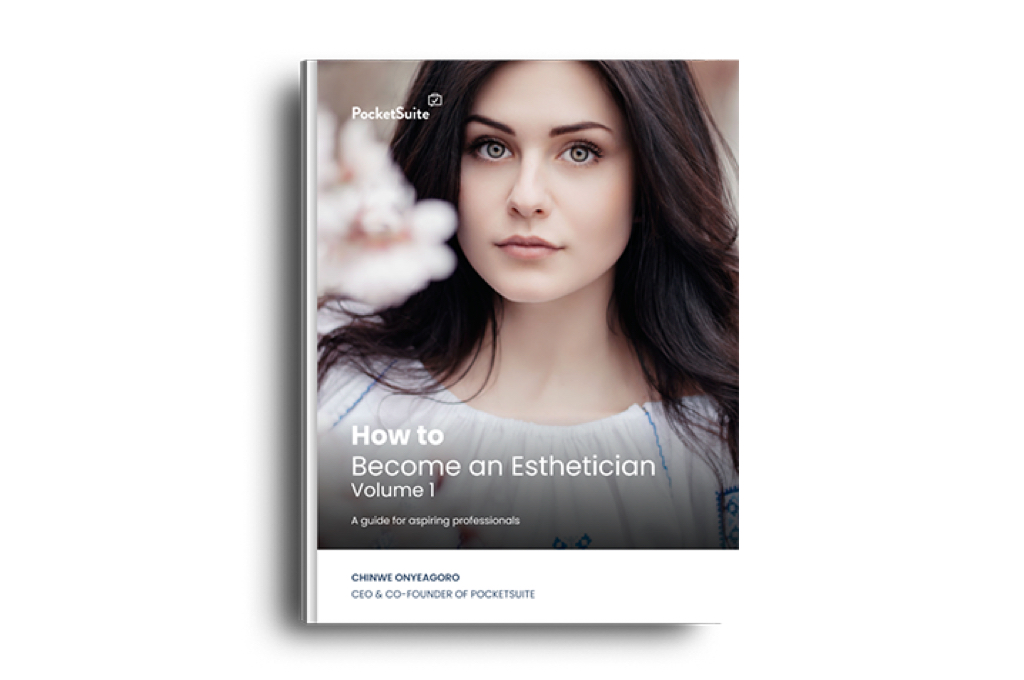
Kim Blackmon lends her knowledge in our latest eBook on How to Become an Esthetician.
Download for free here

